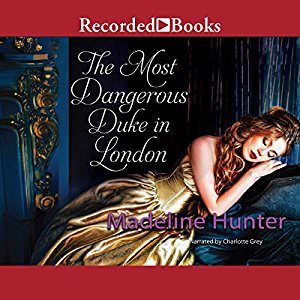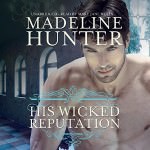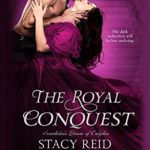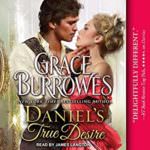I’ve read and enjoyed a number of Madeline Hunter’s books and I count myself among her fans, but given she’s one of the biggest names in historical romance, she’s being very poorly served when it comes to audio. Her last series, the Wicked trilogy, started out well, with His Wicked Reputation being excellently narrated by Mary Jane Wells, but went downhill when Ms. Wells was not used for the rest of the series. I was so disappointed by Lulu Russell’s lacklustre performance in book two, (Tall, Dark and Wicked), that I didn’t bother listening to the final book and stuck to the print version. And for her new Decadent Dukes Society series, Ms. Hunter again gets the fuzzy end of the lollipop, this time with a narrator who sounds like a teenaged girl. Maybe casting youthful sounding narrators works in some genres, but it doesn’t work in romance and it REALLY doesn’t work in historicals, where you need someone who can inject those aristocratic males with a sufficient degree of hauteur while at the same time making them sound attractive enough to appeal as a romantic hero. To cast for the ingénue heroine (although the heroine in this book isn’t an ingénue) almost always means getting someone with a very narrow range, whose voice lacks the necessary resonance and colour to be able to render the hero and a range of supporting characters from formidable dowagers to old family retainers. Ms. Gray has a vocal range of about half an octave, and her ‘hero voice’ is higher in pitch than my normal speaking voice. In the book, Adam, Duke of Stratton, is supposed to be dangerous – he’s fought lots of duels, he’s got an unpredictable temper, he’s dark and brooding and sexy – but he sounds as though he’s barely out of short trousers. I wanted to warm him some milk, ruffle his hair and ask if he’d finished his homework yet.
If I were Madeline Hunter, I’d be seriously displeased.
Adam Penrose, Duke of Stratton, has been living in France for the past decade, whence he fled following his father’s death and the unpleasant rumours of treason and suicide that surfaced following it. He suspects those rumours originated with the Earl of Marwood and intends to get to the bottom of them in whatever way he can. The two families – who are neighbours in the country – have long been at loggerheads, so Adam is surprised to receive an invitation from the dowager Countess (the present Earl’s grandmother) to visit, and further surprised when she suggests patching up their differences in the time honoured tradition of a marital alliance.
The proposed bride, Lady Emilia, is pretty and amiable – and just out of the schoolroom. Adam, who prefers women with minds of their own to those whose conversation consists of inane chit-chat – isn’t interested. He is, however, interested in her much more independent and formidable half-sister, Lady Clara, and decides immediately upon meeting her that she will suit him very well indeed.
But Lady Clara Cheswick isn’t about to allow her plans to be de-railed by an arrogant aristocrat, no matter how handsome he is or how strongly she is attracted to him. The daughter of her father’s first marriage – and her father’s favourite among his children – Clara has been left comfortably off and doesn’t need to marry if she doesn’t want to. And she doesn’t want to, preferring instead to focus her considerable energies and intellect on her publishing venture, a magazine written by women for women which is just starting to achieve success. So the last thing she needs is to be singled out by an attractive, titled man whose family history and whose nickname, “The Dangerous Duke”, gained as the result of the many duels he fought in France, makes him the perfect subject of society gossip.
When Adam first proposes to Clara, she thinks he’s joking, and tells him she isn’t interested in marrying him or anyone – but he doesn’t accept her refusal and sets about courting her, and his persistence is charming, often funny and – fortunately – not at all stalkerish. He never wavers in his determination to marry her, and the more she gets to know him, the harder Clara finds it to refuse him. He’s sexy and funny and clever, he’s genuinely interested in her opinions and what she has to say, and he never talks down to her or treats her as though she is fragile or has cotton wool for brains. Yet lurking at the back of her mind is the suspicion that perhaps there is something more than desire for her behind his pursuit. Given the animosity between their families, Clara can’t help thinking that perhaps Adam is interested in getting close to her in order to find out if she knows anything about the late earl’s possible involvement in his father’s death? Or maybe he wants to use her – somehow – as an instrument of revenge?
The sparks fly between Adam and Clara right from the start, and I loved the way their relationship evolves as they come to appreciate each other’s intelligence, insight and wit. These are two mature people who never underestimate each other and their relationship is very well developed. They are clearly well-matched intellectually and they have fabulous chemistry, their verbal sparring a deliciously sensual prelude to the more intimate relationship that eventually develops between them.
The storyline that deals with Adam’s search for the truth about his father’s death is intriguing and is well-integrated into the main romantic plotline without overshadowing it, and the resolution is unexpected and clever. With two strongly drawn, attractive protagonists, a good story and lots of superb dialogue and sexual tension, The Most Dangerous Duke in London is a very enjoyable book. But do yourself a favour and stick to the print version, because Charlotte Gray’s narration doesn’t even begin do it justice. In addition to what I said at the beginning of this review, her character differentiation is poor across the board; the three Dukes – Stratton and his friends who will be the subject of the next two books – sound pretty much the same, and this is also true of the various female characters, such as Clara’s friends and colleagues working on the magazine. Ms. Gray’s voice isn’t unpleasant and her enunciation is generally good, but her pacing is a little on the slow side, and she often leaves quite long pauses at the ends of sentences. Ultimately, however, her performance is just… boring. She tries to inject a degree of expression and emotion into the narration, but she’s so clearly inexperienced – I can find no other titles by her listed at Audible – and her voice doesn’t have the requisite amount of depth and colour for this sort of story. And don’t get me started on the love scenes, which are hopeless. As is obvious, I can’t recommend this audiobook, and I really hope that Recorded Books engages a better narrator (did they lose Mary Jane Wells’ phone number?) for the other books in this series.
Caz
Buy The Most Dangerous Duke in London by Madeline Hunter on Amazon





It’s a shame when a well known & beloved author’s books are subjected to publishers wanting to save money hire narrators from H***. Publishers don’t that narrating is an art just the way acting, dancing, and painting.
Madeline Hunter is a great author. It’s been a while since I’ve read one of her books.
I really liked the book and would definitely recommend the print version.
I know that with traditionally published audiobooks, the authors often have little or no say (and are sometimes even unaware they’re being produced), but I hope someone brings this to Ms. Hunter’s attention because if I were her, I’d be furious!
Ultimately, however, this is a case of someone at Recorded Books not really knowing what they’re doing. Ms. Grey took on a job she was ill-suited for, but someone had to have offered it to her in the first place. I often wonder if the people responsible for employing narrators actually read the books and, when it comes to historicals, have any understanding of the genre at all. There is a reason people like Rosalyn Landor and Kate Reading are so popular; not only are they highly experienced, they have the sort of voice that naturally lends to their being able to depict a wide variety of characters – especially the men – believably. Very few female narrators – if any – with voices in the same registrer (high) as Ms. Grey can portray male characters at all well. And that is something that a “casting director” or whoever, should be well aware of.